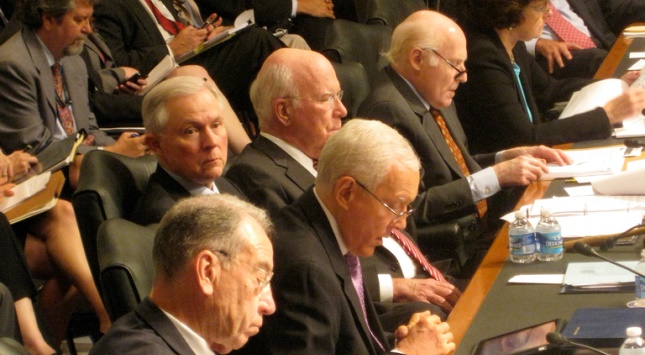 Tomorrow, the Senate Judiciary Committee will begin the long awaited mark-up of S. 744, the “Border Security, Economic Opportunity, and Immigration Modernization Act,” the 844 page bill designed to overhaul our broken immigration system. We can expect some genuine efforts to improve the bill from both sides, but we can also expect a lot of theatrics and grandstanding. That’s the nature of a big committee mark-up, especially on an issue that hasn’t had this kind of exposure in the Senate since the mark-up of the 2006 bill. What can we expect?
Tomorrow, the Senate Judiciary Committee will begin the long awaited mark-up of S. 744, the “Border Security, Economic Opportunity, and Immigration Modernization Act,” the 844 page bill designed to overhaul our broken immigration system. We can expect some genuine efforts to improve the bill from both sides, but we can also expect a lot of theatrics and grandstanding. That’s the nature of a big committee mark-up, especially on an issue that hasn’t had this kind of exposure in the Senate since the mark-up of the 2006 bill. What can we expect?
- This is going to take some time. More than 300 amendments had been filed as of the Tuesday deadline. Senator Grassley alone filed 77 amendments, with Senator Sessions following right behind with 59. This doesn’t mean that every single amendment will be considered, but it does mean that two of the Senators who have been most critical of immigration reform filed over a third of all the amendments that might be considered. Senator Leahy has scheduled an expanded hearing calendar for the mark-up; he has threatened to meet every day during the week before the Senate goes on a Memorial Day recess. The odds are good that, with this many amendments, the Committee will go right up to the Memorial Day deadline.
- Many of the amendments are theatrical. Senator Cruz, for instance, has proposed eliminating all the border provisions in the bill and substituting his own plan to “seal” the border. He has also proposed preventing anyone from becoming a registered provisional immigrant if they have ever been “willfully” unlawfully in the country. In other words, unless you are a little kid, you would be barred from applying for RPI status, which essentially eliminates the legalization program with one tiny, little sentence.
- Some amendments look like chicken scratches, but they may be the ones to watch. Senator Grassley has proposed eliminating a number of the provisions that expand the universe of people eligible for RPI status but you won’t find an amendment that says strike out various groups. Instead, in dry legislative fashion, lines are struck and renumbered, requiring diligent and careful reading to understand the full meaning of the amendment. Many of the most damaging amendments are likely to look innocent on their face.
- The endless fascination with deal killers isn’t the real story. We know from 2007 that delicately negotiated bills can fall apart if the “gang” doesn’t hold strong on what is at the core of the bill, but it isn’t just the gang that matters. Everyone is anxious to figure out what amendments could kill the deal, but it is the more subtle ones—things that the “gang” can live with that may undermine it in the end. The amendments most likely to undermine the core of the bill will either be quickly voted down or will never make it to debate. Discrete things like banning advance parole (travel outside the U.S.) for RPI’s or requiring people to prove they are at 400% of the poverty level in order to become lawful permanent residents or eliminating confidentiality provisions might or might not kill the deal, but will undermine its spirit and could weaken support by the time a bill makes it to the floor.
- It isn’t over until it is over. Mark-up is the beginning of a very long process that goes all the way to the House and conference committee, if we are lucky. Strategies and decisions made regarding really big and important issues for mark-up may not be the decisions made on the floor or later in the process. There are important, unaddressed issues in the bill, such as equal consideration for same-sex couples that require attention—the question is where and when?
These are just a few of the tidbits to be gleaned from the 300 amendments filed yesterday. More analysis, more drama, and more politics will come in the days ahead.
Photo Courtesy of Talk News Radio Service.
FILED UNDER: Chuck Grassley, immigration legislation, Senate


